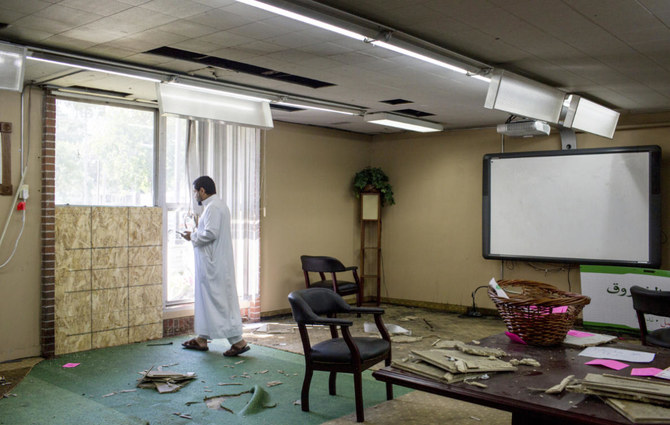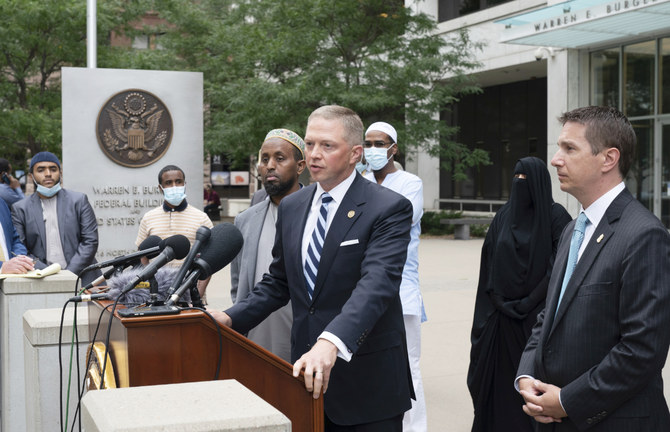ST. PAUL, Minnesota: The leader of an Illinois anti-government militia group who authorities say masterminded the 2017 bombing of a Minnesota mosque was sentenced Monday to 53 years in prison for an attack that terrified the mosque’s community.
Emily Claire Hari, who was previously known as Michael Hari and recently said she is transgender, faced a mandatory minimum of 30 years for the attack on Dar Al-Farooq Islamic Center in Bloomington. Defense attorneys asked for the minimum, but prosecutors sought life, saying Hari hasn’t taken responsibility for the attack.
No one was hurt in the bombing, but more than a dozen members of the mosque community gave victim impact statements Monday about the trauma it left behind. US District Judge Donovan Frank said evidence clearly showed Hari’s intent was to “scare, intimidate and terrorize individuals of Muslim faith.”
“Diversity is the strength of this country,” Frank said. “Anyone who doesn’t understand that doesn’t understand the constitutional promise of this country that brings a lot of people here.”
“Anything less than 636 months would (be) disrespect to the law,” the judge added.
Hari made a brief statement before she was sentenced, saying, “For how blessed my first 47 years of life were, I can’t complain about what the last three have looked like ... considering my blessed and fortunate and happy life, I can’t ask the judge for anything further.”
She also said the victims who testified during Monday’s hearing have been through a “traumatic ordeal” and she wished them “God’s richest blessings in Christ Jesus.”

Michael Hari
Frank said he was prepared to recommend Hari go to a women’s prison, but said the Bureau of Prisons would decide.
Hari was convicted in December on five counts, including damaging property because of its religious character and obstructing the free exercise of religious beliefs.
Members of the mosque asked the judge on Monday to impose a life sentence, describing their shock and terror at the attack. Some were afraid to pray there afterward and have not returned. Mothers were scared to bring their kids to the mosque, which also serves as a charter school and community center.
“I felt really scared because I was going to start school in the same building soon and we lived like six blocks away from the mosque,” said Idris Yusuf, who was 9 when the bombing happened. “I was scared because if these people could do this to our mosque, what’s stopping them from coming to Muslim people’s homes too?”
Afterward, community members said they saw 53 years as justice for an attack that has rattled worshippers for more than four years.
“We were looking for life (in prison), but this is something we can settle for today,” said Khalid Omar, a community organizer and Dar Al Farooq worshipper.
Several men were gathered at Dar Al-Farooq for early morning prayers on Aug. 5, 2017, when a pipe bomb was thrown through the window of an imam’s office. A seven-month investigation led authorities to Clarence, Illinois, a rural community about 120 miles (190 kilometers) south of Chicago, where Hari and co-defendants Michael McWhorter and Joe Morris lived.
Authorities say Hari, 50, led a group called the White Rabbits that included McWhorter, Morris and others and that Hari came up with the plan to attack the mosque. Prosecutors said at trial that she was motivated by hatred for Muslims, citing excerpts from Hari’s manifesto known as The White Rabbit Handbook.
McWhorter and Morris, who portrayed Hari as a father figure, each pleaded guilty to five counts and testified against her. They are awaiting sentencing.
It wasn’t initially clear how the White Rabbits became aware of Dar Al-Farooq, but the mosque was in headlines in the years before the attack: Some young people from Minnesota who traveled to Syria to join the Daesh group had worshipped there. Mosque leaders were never accused of any wrongdoing. Hari’s attorneys wrote in court filings that she was a victim of online misinformation about the mosque.
Assistant federal defender Shannon Elkins also said gender dysphoria fueled Hari’s “inner conflict,” saying she wanted to transition but knew she would be ostracized, so she formed a “rag-tag group of freedom fighters or militia men” and “secretly looked up ‘sex change,’ ‘transgender surgery,’ and ‘post-op transgender’ on the Internet.”
Prosecutors said gender dysphoria is not an excuse and said using it “to deflect guilt is offensive.”
Prosecutors asked for several sentencing enhancements, arguing the bombing was a hate crime led by Hari. They also say Hari committed obstruction when she tried to escape from custody during her transfer from Illinois to Minnesota for trial in February 2019. Hari denied trying to flee.
Hari, a former sheriff’s deputy and self-described entrepreneur and watermelon farmer, self-published books including essays on religion, and has floated ideas for a border wall with Mexico. She gained attention on the “Dr. Phil” talk show after she fled to the South American nation of Belize in the early 2000s during a custody dispute. She was convicted of child abduction and sentenced to probation.
Before her 2018 arrest in the mosque bombing, she used the screen name “Illinois Patriot” to post more than a dozen videos to YouTube, most of them anti-government monologues.
Hari, McWhorter and Morris were also charged in a failed November 2017 attack on an abortion clinic in Champaign, Illinois. Plea agreements for McWhorter and Morris say the men participated in an armed home invasion in Indiana, and the armed robberies or attempted armed robberies of two Walmart stores in Illinois.















